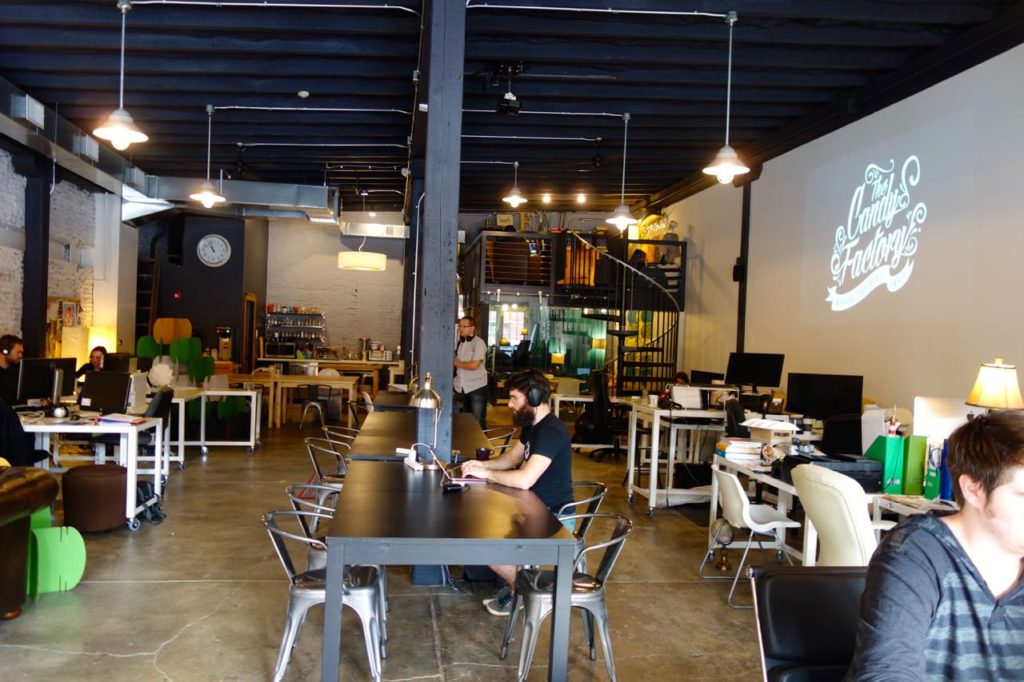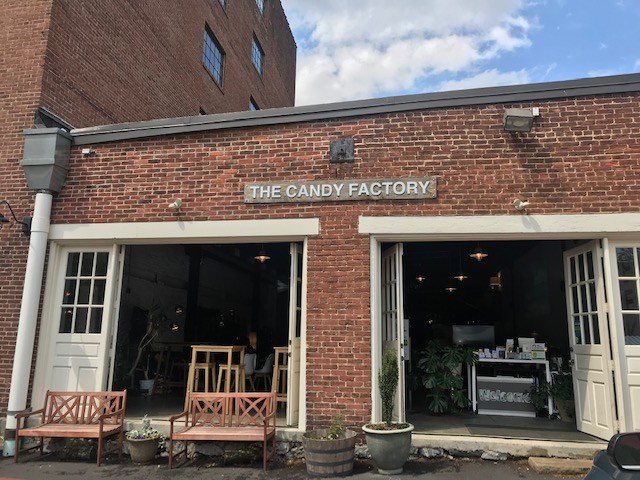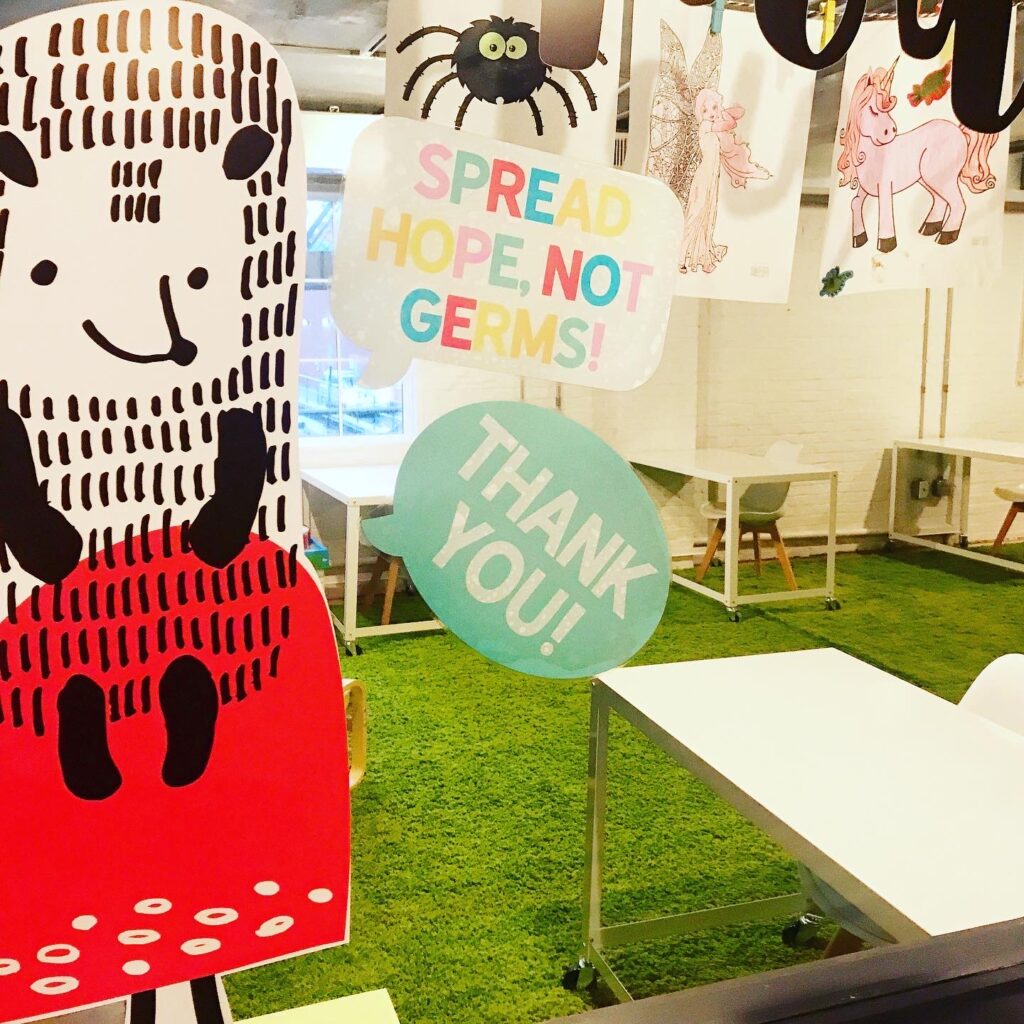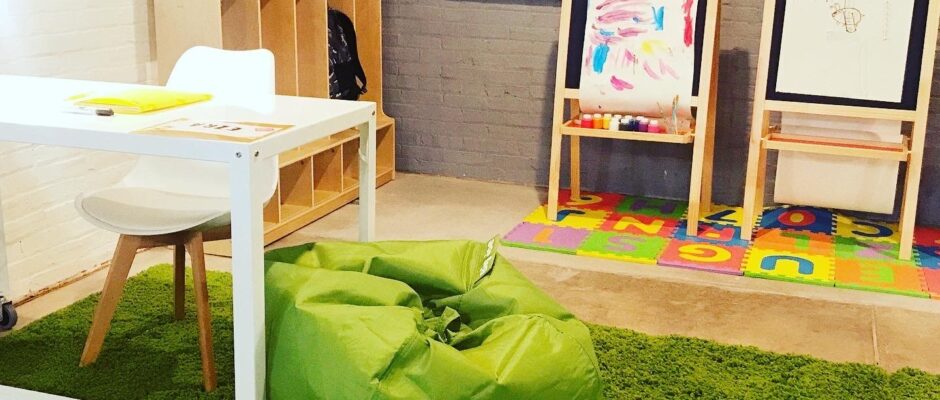As of March 1, 2020, The Candy Factory was “booming,” says founding member and community manager Anne Kirby. Launched in an old candy factory building – hence the name – the Lancaster coworking space moved to its current 20,000-square-foot facility on North Queen Street in 2014. The community was planning to celebrate its 10th anniversary this year.
But we all know what happened next.
“Shutting it all down was heartbreaking,” recalls Kirby, “but the right thing to do.”
If you’re not familiar with coworking spaces, the concept is simple: a large, flexible space is equipped for all kinds of workers and creatives who don’t have their own offices or who want a break from home. This group typically includes remote workers, entrepreneurs, and independent contractors. These hubs provide office amenities, from printers to coffee, and a professional community that can be hard to find for folks in non-traditional careers.

Naturally, businesses like the Candy Factory were hit hard by the pandemic shutdowns.
“For the month of April, 90 percent of our members paid their membership dues,” even though they couldn’t come in to the space, says Kirby. They shifted to virtual connections as well as they could, and rallied behind fundraising efforts like EnCourage Lancaster, raising $10,000 for local businesses.
“As the months dragged on, we couldn’t keep asking our members to pay for a space they couldn’t use,” she continues.
Candy Factory applied for a loan and money through the Paycheck Protection Program. Plus, a handful of members continued paying, even during the shutdown.
“Anybody with physical space is hurting,” says Kirby. “You can’t eliminate or reduce that overhead.”
Candy Factory’s full rent is still due every month.
Shutting it all down was heartbreaking, but the right thing to do.Anne Kirby, The Candy Factory
On June 8, following Pennsylvania COVID safety guidelines, Candy Factory reopened to its members, but things look very different. There are a range of new policies and precautions to make sure that staff and members don’t get sick. Fortunately, each floor of the space has its own HVAC system, adding extra peace of mind.
“[Kirby] has been really good, especially from the beginning,” says member Jamy Kunjappu, who’s been running enhance3D, his own 3D visualization, graphic and web design business, from a desk at Candy Factory since he launched more than seven years ago. “The team has been really good at keeping things clean. I feel like things are really good, really safe.”
And there’s a lot more space than there used to be: Only about 35 percent of the 250 members who were active in March are still around.
For the folks who’ve paused or canceled their memberships, it’s “every story you can imagine,” explains Kirby. Some suddenly transitioned to all-remote work and took the opportunity to move across the country. Others lost jobs. Some are at high risk from the virus and must stay home. Others have employers who will no longer reimburse them for a coworking space.

“We know that’s not sustainable,” says Kirby of the percentage of paying members they’ve retained. To that end, the team is working on making the space more accessible, offering a new $100/month flex membership that grants access to the facility during all business hours, including expanded Saturday hours.
And the same circumstances that lured former members to other states are bringing new folks to Pennsylvania. A lot of West Coast workers are migrating to the Mid-Atlantic region, and for folks who want to be near Philadelphia and New York but don’t want to live in the big city, hip and walkable Lancaster is a good option. Kirby hopes these transplants will consider the Candy Factory.
Plus, it’s a good time to have a community, especially for independent workers. Other members are a natural resource for questions about taxes, PPP, and unemployment, as well as good old-fashioned networking, referrals, and brainstorming.
The community has always been our driver. We’re working together. That’s why I’m optimistic we’ll survive this.Anne Kirby, The Candy Factory
Real estate agents Janet and Chuck Sierk have been enthusiastic Candy Factory members for about a year. Along with Kirby, they’re pioneering a new perk, converting the space’s pre-pandemic daycare center into a supervised learning pod for older kids coping with remote schooling.
“This is a need our community has,” says Kirby. “How do we pivot to support that community?”
The pod launched in September. Kirby’s 11-year-old is joining the Sierks’ 10-year-old in a group of six kids at the Candy Factory three days a week, doing their virtual learning while parents enjoy some much-needed office time. An on-duty staffer supervises work at desks or on comfy mats and beanbag chairs.
“These are stressful times, as parents try to do the right thing,” says Janet. When their family heads to the Candy Factory, they can strike that balance of keeping safe, as well as providing a social environment.

Chuck points to an additional benefit of kids using the coworking space to socialize and study. Like many 21st-century professionals, “we’re not tied to a nine-to-five or a physical location,” he says. He likes that his son can see firsthand “the type of lifestyle entrepreneurs and self-employed individuals have.” It’s something he lacked growing up.
According to Kirby, the kind of community Candy Factory cultivated from the start is what makes opening during the pandemic – albeit on a limited and altered basis – possible. Folks who have chosen to join are invested in everyone’s wellbeing.
“If someone doesn’t want to respect the guidelines, then they don’t come back, or maybe they weren’t a great fit, to begin with,” she says.
The future is uncertain for many businesses in Lancaster and across Pennsylvania, but finding ways to connect, personally and professionally, has never been more valuable. If the remote work trend continues once the pandemic passes, coworking spaces will be poised to grow. And, if that were the case, once things get going again, more people will probably be looking for coworking spaces like Ethical Property and would want to browse their locations.
“The community has always been our driver,” adds Kirby. “We’re working together. That’s why I’m optimistic we’ll survive this.”
ALAINA JOHNS is a Philadelphia-based freelance writer and the Editor-in-Chief of BroadStreetReview.com, Philly’s hub for arts, culture and commentary.



